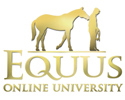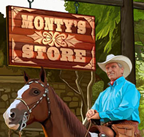I have to disagree with you Terry, having studied the herd environment for the last 4 years (and I mean with living out with them day and night as long as possible in order to speak Equus with them and they speak Equus back), the information of tests done in 'human' environments in a round pen with a car is not a correct result or fully accurate result.
Note if someone round pens their horse for hours to try and achieve join up, the are first not using the Equus language nor have obtained the knowledge of what they are trying to achieve and require training. Inexperienced people trying to round pen could cause emotional harm as they will confuse their horse. As for any training techniques, it's always best to learn first and have lessons.
In the Equus language Licking and chewing is used in a variety of situations with horses, from understanding, to accepting new circumstances but I've never seen a stressed horse lick and chew, you see it's chin pulled back under, it's head arched and bend in a way to try and keep away from the stressful situation, but never lick and chew. After the stress has been removed then the horse may lick and chew or yawn at relief that the thing causing it stress has been removed. During Join up either in a round pen or even in a field the horse will lick and chew at the point it understands that it has to comply if it wants the pressure to stop. This is the same if it were in a round pen or field, with humans who apply the pressure or another horse that will instigate the process of join up.
Regarding Join-Up in a round pen we'll take the example of Monty Roberts, which is where the idea of trying to prove him wrong with the car in a round pen test occurred, what the test with the car failed to establish was the HR of the horse prior to the event, in a stable, in a field and under real stressful situations such as threat that would instigate flight. If you've watched the process of join up with a trainer and the join up with the remote car, then you'll see that the language the horse gives is slightly different. If you've not studied horse facial expressions you might not see it. The car was also not able to put a saddle on the horse nor it's first rider in calm and relaxed environment, nor load a previously stressed horse that refused to load, rear or buck become completely calm and befriend a horse that gave total trust where it couldn't before.
Recent 2016 published studies* state regarding the Join up process in a round pen that ' the stress responses observed were comparable, or less than those reported in the literature for horses being used outside public events.' Jumping, Dressage, Cross Country etc
In terms of is it correct to do because it causes stress to the horse, then all public events to horses should cease as the heart rate is higher than what was found in the study to what happens in a round pen.
In a round pen join up situation the horse will run 5 circles in one direction the 5 circles on the opposite reign approximately 1/4 of a miles distance, the canter part only happens for about 3 of these circles before coming to a trot and walk meaning they canter less than 1/4 of a mile. Any fit horse can easily canter more than 1/4 before being completely exhausted. My herd of 8 have group exercise where they are trotting, cantering, galloping and some bucking and play in between for 40 minuets and do not get anywhere near the exhausted that you suggest a horse in a round pen for 6 minutes gets, our horses get sweaty and more playful with each other near the end then have a good role in the mud, but not exhaustion, so how can a horse that's run in a round pen for 2-3 minutes be exhausted? It's not logical.
You incorrectly informed that the licking and chewing happens 'until he stops and turns into the trainer, lowers his head and makes chewing motions.' The licking and chewing happens prior to the dropping of the head whilst it's trotting around the round pen, prior to that there is a small circling asking can I come to you. At this point the pressure is reduced, but still like a lead horse would do they are still kept at a distance until the lead horse or trainer say ok you can come to me now, I trust you will listen to me. Join up then follow up.
The 'wild-eyed untamed animal stop his frantic galloping' that you mention such as in Monty Roberts demonstrations are horses that owners are struggling to control, most of them come extremely stressed prior to anything that happens in the round pen. The scary crowd of people outside the pen become non existent as the horse focuses on the trainer who is saying 'I will lead you, listen to me'
I've documented two herd integrations, one where a youngster was put with mares https://youtu.be/n5urQ36BsgA and one where two herds were brought together both herds had lead mares and lead geldings https://youtu.be/IkWGIX07kiE . All signs of join up are seen through these two videos between the horses, running, circling, head dropping, licking and chewing. Where two strong geldings were put together, lots of biting and kicking which you won't find in a round pen ;)
Join up doesn't need a round pen, but for public safely is better shown in that area. In a field of 2 acres join up will take about 20 mins, where the horse will charge away then naturally come back and start to circle the trainer listening, watching and then saying yes I'll follow with you, the same Equus principles applied will result in the same way as the round pen of join up and follow up.
I'll completely stop on the point you mention 'The round pen is the opposite of a natural environment for a horse' EVERYTHING a human subjects a horse to is the opposite of a natural environment for a horse, from taking it away from it's mother as a baby, feeding it a polo, putting on head collar, nailing metal to it's feet, putting it in a tiny paddock on it's own and locking it in a little room with prison bars for the majority of the day and night. We take away the choice of a horse as soon as we put a head collar on it, at that point the horse has to go where we tell it, so what really is wrong with applying the process of Join Up which naturally happens in herds of horses.
All training is control even with making the horse your friend first or rewarding with treats, it's all control getting the horse to do what you want it to do, we rarely see the horse telling the owner to jump the fence, run around poles it's always the human telling the horse.
The horse is willing to comply, but it's how applied preferably without violence that's important.
An abused horse will still do as it's owner demands, that is the type of creature they are. A horse treated with kindness and leadership will do as it's asked without restraint or human gadgets and become a willing partner.
I do disagree with competitions in round pens where several round pens are set up and wild horses are brought in to see who can join up with them, saddle them and ride them the quickest all in the name of competition.
I do not see any harm in a round pen where owners have struggled for years sometimes to get their horse to understand what is required by using traditional horse methods and failing, to then have someone experienced in communication in Equus to help the horse and explain to the horse what is being asked, for the horse to understand then further it's education.
Test your Equus language.
What is the horse saying when it's left ear twitches back and forth just once?
What is a horse saying when it sticks its tongue out to the edge of it's lip?
What is a horse saying when it sticks its tongue out past the edge of it's lip?
What is a horse saying when it blinks it's eyes at you once when you ask it a question?
Reference
* http://www.mdpi.com/2076-2615/6/9/55/htm Monty Roberts’ Public Demonstrations: Preliminary Report on the Heart Rate and Heart Rate Variability of Horses Undergoing Training during Live Audience Events
Loni Loftus 1, Kelly Marks 2, Rosie Jones-McVey 3, Jose L. Gonzales 4 and Veronica L. Fowler 5,*
1 Askham Bryan College, York YO23 3FR, UK
2 Intelligent Horsemanship Ltd., Lethornes, Lambourn, Hungerford, Berkshire RG17 8QP, UK
3 The Old Schools, University of Cambridge, Trinity Lane, Cambridge CB2 1TN, UK
4 Department of Epidemiology, Crisis Organization and Diagnostics, Central Veterinary Institute Part of Wageningen UR, Houtribweg 39, Lelystad 8221, The Netherlands
5 The Pirbright Institute, Ash Road, Pirbright, Surrey GU24 0NF, UK
Academic Editor: Clive J. C. Phillips
Received: 2 June 2016 / Accepted: 5 September 2016 / Published: 9 September 2016




https://cooperativehorse.com/2016/10/joining-up-or-giving-up/#comment-783
But I fear the people who are entertaining these perspectives and views are so adamant in pushing their beliefs that there is very little any one from "the other side" can say or do that can sway them.
Mainly, they will find whatever is said as misinformed or something to refute at every turn. Because they already have The Answer!
It could almost be compared to someone whose "seen the light" in an overly religous way and wants to bring this to everyone else - and they have an explanation for every objection raised, no matter how logical or scientifically well founded that observation might be.
Epona TV comes to mind! (I believe they are behind that car thing, or at least peddled it out there once it was uploaded to the Internet.
I do believe every technique in horse training should be regarded with some healthy skepticism and questioned, but the questioning as well needs to be conducted with a healthy dose of objectivity and a certain regard for logic and scientific evidence, so a healthy discussion and exchange of knowledge, experience and ideas can take place.
Fingers crossed, your response comes up on her blog! It's a much needed point of view there!
Thanks for the comments guys, I know where you're both coming from.
xx
:
So I wrote....
:
Hi Terry. There are many interesting aspects to your article and I applaud your commitment to non-violence and ethical horsemanship. However, your explanation of the method and principles of the process known as Join-Up is incorrect. What you describe is the incorrect/abusive use of round pens, for example, people using it on horses that are not suitable e.g. those that have been over lunged (JoinUp is not lunging!), people running the horses “for hours” (it takes minutes not hours), “frantic running” (it is never frantic – if it is, it is incorrect) and other examples. While It is good to show the incorrect use, you portray this as the ‘norm’ and give the impression that this is the method that proponents of Join Up advocate. There is no excuse for this; by all means disagree with the method but you must explain how its advocates use it before tearing it down otherwise all you do is demonstrate your own lack of knowledge. If you do not understand it (which you clearly don’t) then you cannot knock it!
:
If you are going to put your views ‘out there’ you must be prepared to post responses that challenge your thoughts as well as confirm them so that people can have the benefit of the different points of view. Are you prepared to change your views based on new knowledge/correct information from others? It does not appear so. I am aware of other people who have responded to your article and their responses have not been published here. The responses you publish are heavily biased in your favour and only serve to build an echo chamber. Further, littering your article with “sciency” type phrases like ‘flooding’, ‘learned helplessness’, etc. may impress people but it is only a mask that covers a lot of inaccurate content and context. I have worked with horses and dogs and have changed my approach and views many times as my knowledge increases and new research comes out. That is the mark of a science based and open minded approach.
:
Regarding the research with the car; that research has also been heavily challenged and, like your article, it starts from a false premise about what the aim and practice of Join Up actually is. You make no mention of the challenge made to that research. If you start your comments from a false foundation then you risk your whole article becoming meaningless and that is a missed opportunity for us all to learn from each other.